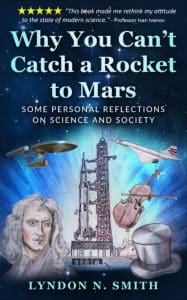About Why You Can’t Catch a Rocket to Mars: Some Personal Reflections on Science and Society
Hey, you, all lovers of science and technology, this richly illustrated book is for you, no matter what age and what level of understanding of physics you have. This is a combination of humour and scientific insight at its best. The author, Lyndon N. Smith, a highly-acclaimed British academic, explains in a unique, provocative, and accessible way the past and present approaches of scientific endeavour and invites you to a discussion about the fascinating technological developments that we may expect to see in the future.
This is popular science with a twist – both entertaining and educational! You will be taken on a journey touching on more conventional topics such as transport, robotics and manufacturing to the more exciting ones such as artificial intelligence, nanotechnology and rocketry. The author discusses the effects we may expect such advanced technologies to have on our lives, including the prospects for extending life and achieving interstellar travel, with all their astonishing implications. Physics students, academics or laymen, be ready to be entertained!
This information-packed book has now been released as an audiobook with a reading by the author, so now you can literally hear about the future of science and technology while in the car, at home or anywhere else you please – apart from, currently, Mars! The audiobook is accompanied by a pdf file that contains a large number of drawings and illustrations, which were created by the author for the book.
Buy the book, and follow the author on social media:
Learn more about the writer. Visit the Author’s Website.
Like the Authors Facebook Fan Page.
Author Bio:
Lyndon N. Smith has a strong interest in science and technology, and a particular fascination with developments in physics and engineering that can have potentially revolutionary effects on the way we live. He feels that scientific and technological developments of recent decades have been less dramatic than was expected, say, seventy years ago and that an investigation into why this is the case and what we can do about it is well overdue. His background includes degrees in physics, robotics and engineering, as well as 26 years of research experience in the UK (and USA), which has resulted in 180 technical papers, two books and the supervision of 20 PhDs. As well as being a professor at a major UK university, he is also something of a bibliophile; but has had a long-standing concern about the lack of accessibility of many science and technology related publications, in terms of the associated difficulties with public engagement with science, as well as reducing the likelihood of science having a strong and beneficial impact on society. He believes that one way to increase the accessibility of science is to employ an informal style, and to make liberal use of quotations and allusions to well-known figures from popular culture. This is what he has aimed to do with his new book. His intention is to make you wonder why we don’t hear more about how modern technologies can revolutionise our lives. He believes we need to spend more time and effort on looking to the future rather than agonising over the past. And he uses discussion of people and events from the past, as well as various predictions of the possible future, to throw light on the situation for science and technology, and what developments we might expect going forward. Lyndon lives in Central Somerset, with his wife and son.
